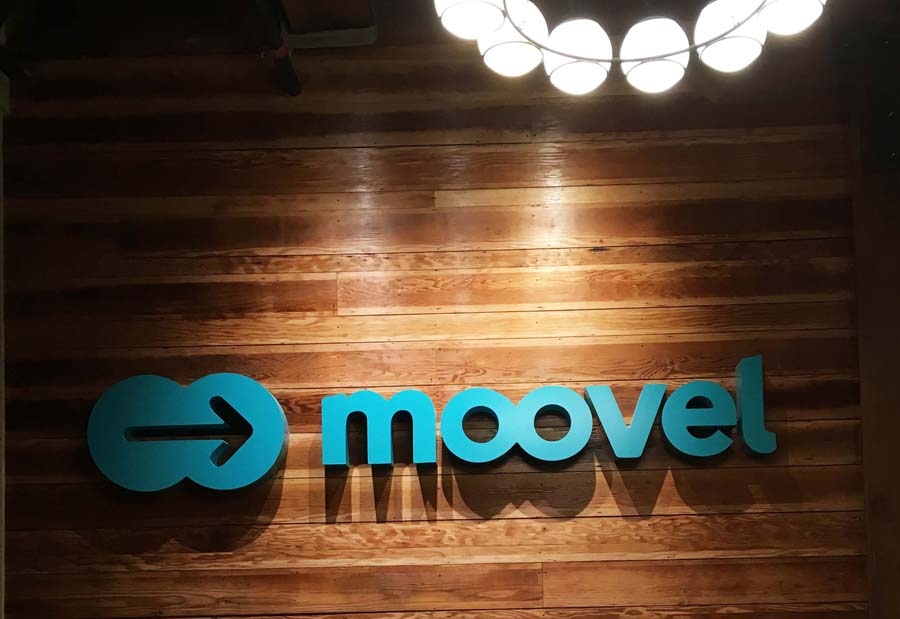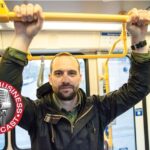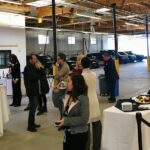During a Moovel open house, CEO Nat Parker talks about the importance of transportation alternatives and smart technology.
Oregon lawmakers are working on a transportation package, and many industry experts say transit and automation should play key roles in limiting traffic and auto-related pollution.
Portland-based Moovel North America is on the leading edge of the tech-transit mobility business. The Daimler subsidiary held an open house for its splashy new $3.5 million Old Town headquarters yesterday. After the festivities, I caught up with CEO Nat Parker to talk about the new Hop Fastpass, transit and smart tech solutions and what it’s like to be under the Daimler umbrella. (A photo tour of Moovel’s HQ appears at the end of this interview.)
OB: TriMet’s Hop Fastpass launches this year. How will the card impact Moovel’s TriMet Tickets app?
Parker: Moovel is developing the mobile apps for Hop as well. We’re building the account management app that will let you to manage the account balance on your smart card. We’re also developing the inspection application that transit police, fare inspectors will use. They’ll tap the card using NEC technology.
Both technologies will serve potentially different use cases. People who ride every single day and want to take advantage of fare capping, which gives them the best fare possible, will use the card. People who don’t ride every day will find the existing app fine. I think TriMet is saying, ‘Let’s let both coexist; let’s see how they do.’
Our vision is to get rid of the card itself. The idea is: Why have a card when this [a cellphone] has the same technology? In the future users will be able to tap with their mobile device.
OB: But shouldn’t the Fastpass have come before the app?
Parker: Long story short: Card based systems certainly have been around for two decades. New smart card accounts are managed in the cloud. I think we totally agree that this experience [cellphone apps] soup to nuts is the way to go.
OB: Seattle area voters passed a ballot measure last November that will fund $54 million in transit infrastructure. Would you like to see Portland do the same?
Parker: Without question. I think we have a huge opportunity to extend our fixed rail but also to look at bus rapid transit in areas like Powell and Holgate. These are areas that could afford more frequent service.
I think there are still stalwarts holding out hope we can bring light rail to Vancouver. We know that adding lanes doesn’t solve the problem. It’s this concept of induced demand: more lanes, more people drive. I think we want to have a balance of transit heavy and transit focused development with some of those smart upgrades.
OB: So what’s the single most important decision Portland can make to solve congestion?
Parker: We need to reduce single occupancy vehicles. At the end of the day you’ve got to have fewer vehicles on the road. That’s one of the promises autonomous vehicle technology, autonomous fleets as a service really has.
We envision a future where Daimler will service cities on demand with an autonomous vehicle fleet. So I think the emphasis on access to vehicles versus vehicle ownership outright is really the important hallmark for where we see easing congestion challenges.
[The New York Times reported yesterday that ride-hailing companies Uber and Lyft are pulling riders from public transit and worsening congestion in the process.]
OB: It’s been 19 months since the startup you founded, GlobeSherpa, was acquired by Daimler and became Moovel. How has the acquisition reshaped your goals and operations?
Parker: GlobeSherpa was 27 people at the time of acquisition. At the end of the year we’ll be about 125 people. So phenomenal growth and capability to expand our service.
I also think when we come to the table not just as a startup but as the mobility innovation arm of Daimler, this is a completely different scale. The city presence we can really support is much larger. It’s a bigger pot we’re going after now.
We’re looking at transportation across the world. We’re looking at not just transit but alternative transportation options connecting car share and bike share transit. It brings with it an enormous opportunity. There’s some small process oriented things that always come with being part of a larger company, but boy are they worth it.
Just look around, this is a result of being part of that.
[Moovel’s new house has a familiar look and feel: The warehouse style building features an open floor plan, exposed beams and recycled wood. Three curved walls enclose the second floor reception.]
***
A slew of dignitaries, Mayor Ted Wheeler, Rep. Suzanne Bonamici, TriMet’s CTO Tim McHugh and Tech Association of Oregon CEO Skip Newberry, spoke at the Moovel open house.
“I can’t imagine too many other places where you can walk out the door you can call up a car service, you can rent a car short-term, you can even rent a bike, you could probably rent a skateboard in this town, you can take a bus, you can take mass transit,” Wheeler said. “The options are growing rapidly.”
The mayor did not address the city’s intent to investigate claims that Uber used software to skirt Portland regulators.
{igallery id=1898|cid=26|pid=1|type=category|children=0|addlinks=0|tags=|limit=0}






